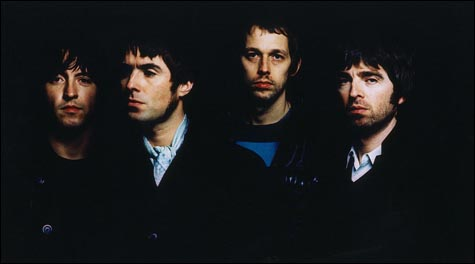
MASTERS OF VACANCY: On Stop the Clocks, one hears not a well-oiled stadium shaker but a band knocked together out of empty phrasings and borrowed riffs.
|
In Britain, it was always going to happen. The rise of Oasis in the mid ’90s, like the rise of a fascist dictator, was tribal, libidinal, irresistible. Overexcited music writers dropped their pens and shed their critical delicacy; the industry had a hot flash; and the simple folk of the pubs and clubs, bug-eyed on cheap cocaine, rallied to this new thing with a wild, self-discovering gladness. And why not? Five shifty and truculent Mancs with four chords per song and lyrics of nursery-rhyme effrontery (“I’m feeling supersonic!/Give me gin and tonic!”), Oasis were a relief, a living retort to every tendency in popular music for the previous 10 years. No Black Flag or Black Sabbath in their past: the depressive slurrings of grunge had nothing to do with them. Neither did godless techno (except insofar as it provided an opportunity to take drugs), or the local squalor and neurosis of indiedom. In their combined lifetimes Oasis seemed to have heard only two albums: Never Mind the Bollocks . . . and Rubber Soul. They dressed with working-class propriety — clean shirts, brushed hair — and sang rowdily about wanting it all and living forever. And with the release of their 1994 debut, Definitely Maybe, they seized a title for which there were suddenly, remarkably, no other contenders in sight: the title of Greatest Rock and Roll Band in the World.
In the US, on the other hand, it was always not going to happen. Easier to see this in retrospect, of course, but even in their first feints at global domination Oasis, at some level, appeared to be aware that they weren’t going to crack America. Noel Gallagher, band boss/songwriter, was canny and pop-literate enough to understand that the tide, post-Cobain, was against them, and as for his little brother Liam . . . in his 1997 book Take Me There, journalist Paul Mathur records an encounter that took place in July 1994 in the foyer of New York’s Paramount Hotel, hours before Oasis’s first gig in the US, between Liam Gallagher and what Mathur calls a “grunge pest.” “You’re never going to make it in America,” prophesied this flannel wearer in passing. “I bet you sound like the fuckin’ Soup Dragons. America doesn’t need you.” Gallagher’s response was vintage: “Listen, man, I can do things you can’t even dream about. I’ll steal your soul and you won’t even notice. I’ve stolen it while you were standing here. . . . And you can fuck your fucking Pearl Jam too.”
The American Anglophile tends to enjoy Englishness in its more wistful and literate forms: Morrissey, Blur, the Kinks’ Waterloo Sunset, shy bards coiled at rainy windows. Liam Gallagher had no place in this company. On stage, snarling, hands behind his back and a tambourine round his neck (as if it just been broken over his head), he had the demeanor of someone scornfully blowing off a prestigious audition. He didn’t “rock out” or fling himself into the drumkit like a rag doll. When especially moved, he would give two fingers to the crowd or break into a brief and surly ape jig. And nothing could stop him from loudly proclaiming the glory of his own band: the best, the biggest, the baddest. Americans are not unappreciative of rock-star bombast, not at all, but they prefer it to be confined to the arena of hard rock, where the bigmouth can go shirtless and do star jumps off his Marshall stack. It’s all right for Ted Nugent, in other words, to talk about rocking your scrotum into a cyclone of burning skulls, etc., but not for the Shins.
And then there were the acts of straightforward career self-sabotage. Oasis’s 1996 US tour, which began a fortnight after their biggest ever English shows (two nights at Knebworth Park, in front of a total of 250,000 people), was a farce of exits and entrances. On August 27, as the band slouched toward the gate for their second transatlantic flight, they were startled to see their vocalist enthroned in the passenger seat of an airport buggy, its light busily flashing, heading at speed in the opposite direction. Liam had decided to stay home. At the tour’s first stop, in Rosemont, Illinois, the entire Oasis set would be sung by Noel, in his strained, serviceable, Mott-the-Hoople voice. Prevailed upon to rejoin his mates, the capricious Liam arrived a few days later, in time to perform the last track from the then new What’s the Story (Morning Glory) at the MTV Awards at Radio City Music Hall. Another disaster: “Champagne supernova up yer bum!” leered Liam into TV land before swatting his mic stand and loosening a slow length of drool from his pursed lips, all the way down to the floor. The tour limped on, to terrible reviews (“Liam Gallagher should have stayed in England,” opined Newsday after a show on Long Island), until on September 11 it was Noel’s turn to freak out. The brothers came to blows, and he flew home. The rest of the band followed two days later.